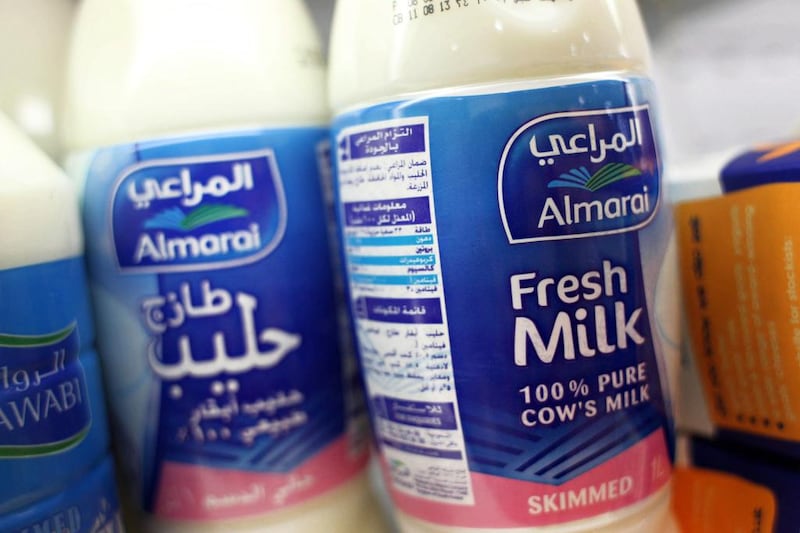Almarai, the biggest dairy producer in the Arabian Gulf region, reported a 2 per cent year-on-year drop in net profit in the second quarter of 2018, falling short of analysts’ estimates for the period.
Net income for the three-month period to the end of June dropped to 660.6 million Saudi riyals (Dh546m), the company said in a statement to Saudi Stock Exchange, where its shares are traded.
The profit drop was due to a “decline in export sales, changes in demographics, a general contraction in the market coupled with an increase in product promotions and general changes in the product portfolio mix”, Almarai said in the bourse filing. Revenues for the period declined 0.8 per cent, it said.
Net profit for the second quarter came in 3.9 per cent below the average 687.3 million riyals estimate of analysts polled by Bloomberg.
A 3.2 per cent year-on-year decrease in gross profit was due to the higher cost of sales – primarily driven by higher alfalfa cost and an increase in labour costs. However, this was partially offset by better cost management, stable commodity costs and enhanced production efficiencies, the statement added.
Almarai said profit for its dairy and juice category slumped by 8.1 per cent year-on-year over “due to adverse market conditions” as well as a reduction in export sales and widespread discounting, especially in long-life products.
_______________
Read more:
[ Milk price increases unlikely to impact Almarai stock valuation ]
[ Almarai reports 4.3% drop in fourth quarter net income as sales slump ]
[ Saudi Arabia’s consumer sector is improving, says BMI ]
_______________
The GCC market overall remains challenging with negative consumer trends continuing throughout the course of 2018, the company said. Challenges include structural economic changes driving higher costs in energy and transportation, a shift in the retail landscape leading to the closure of more than 3,000 shops, the introduction of VAT, implementation of the expatriate levy, and lower export sales combined with a general slowdown in the GCC markets.
Overall for the remaining part of the year, the company anticipates the same underlying trends to continue within core categories.
The dairy segment of the company has already slowed down on the back of lower consumer spending following VAT implementation from January, a tough macroeconomic environment and intense competition in the food and beverages sector in the kingdom.
This year, Almarai increased the price of various categories of its milk products by 5 to 9 per cent, citing higher energy, fuel, fodder and labour costs as the reason for the rise.
Last week, Saudi lender Al Rajhi Capital said the price hike could boost the dairy producer’s profitability, but it is unlikely to materially impact the stock valuations of the company.
"While we consider the dairy price hike to be positive, we don't see a material impact on our valuation [for Almarai stocks], considering the possible decline in volumes amid higher prices," Al Rajhi Capital said in a research note last week.
“Our calculations indicate that the price rise could improve bottom-line provided the volumes remain broadly unchanged.”
However, Al Rajhi’s report said the market share of the company will remain firm due to Almarai’s brand name.
“The discretionary income in the hands of Saudi population is expected to grow over the period as Saudisation gains momentum”, it said.






